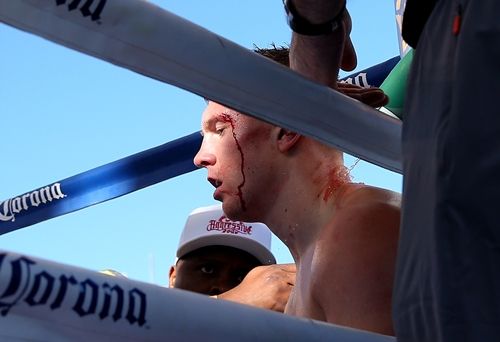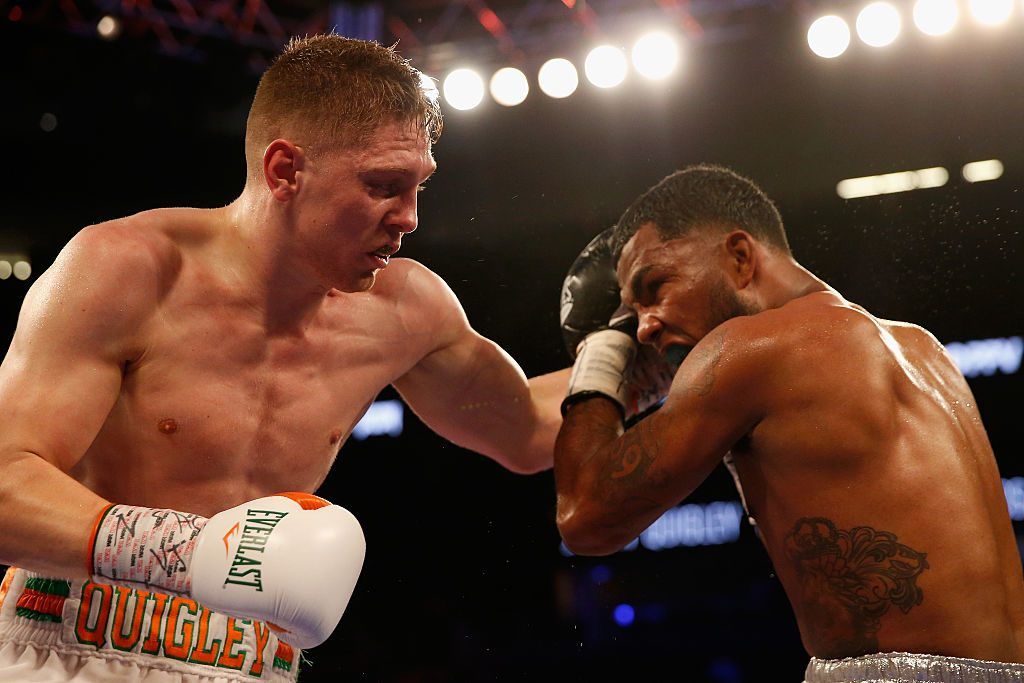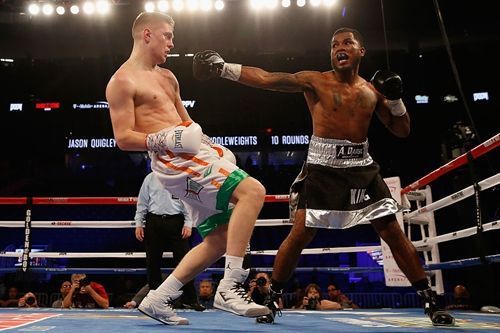

Share
4th August 2018
01:29pm BST

"It's like everything. Why does an artist go and draw on a piece of paper or paint on a canvas? Why does a footballer go on a pitch? Why do people do these things? Because it is just in us." "There are doctors out there who say they could never go into a ring and box. I could turn around and tell them I could never sit at a desk in an office every day telling people what's wrong with them. It's either in you or it's not in you. Boxing's well and truly imprinted in my heart, for sure."In this sense, Quigley is very lucky. Many of us will trudge aimlessly through existence without feeling a sense of purpose as strong as that. However, being so deeply connected to a certain venture comes with its risks. When it gets taken away, you can lose yourself. That's exactly what happened to Quigley after he beat Glen Tapia to win the NABF strap, the first title of his professional career. https://www.instagram.com/p/BSEUiZBh3yg/?utm_source=ig_embed&utm_campaign=embed_loading_state_control
"When you're sitting in an apartment in LA, no real family or friends around you, sitting with a cast on your arm thinking, 'Where's my career at here? Am I ever going to be able to box again? Will this feel right?' It was a very lonely and dark place but, as I says to you, going into these dark and lonely places make you or break you."The doubts understandably set in. With all that time left alone to ruminate, Quigley feared the worst. All those negative thoughts took their toll.
"I went through, yeah, probably bits of depression and everything like that. Being out of the ring with no fights coming up, not being able to train - everyone knows how much of a buzz you get off training, sweating and building up a good energy but for me, I couldn't do it.
 Quigley found himself in unfamiliar territory. He was flat on his back, the volume was fading and he was waiting to be counted out. With the lights fading and the volume decreasing, he finally decided to stop waiting and take some initiative.
Quigley found himself in unfamiliar territory. He was flat on his back, the volume was fading and he was waiting to be counted out. With the lights fading and the volume decreasing, he finally decided to stop waiting and take some initiative.
"It came to a stage where I was putting on a wee bit of weight and I says to myself, 'Look Jason, there's only two ways you can go with this. You can play the bad life, eat what you want, lay about, be lazy and let the hand heal a bit longer than it probably should heal or you can get up, go for short spells of walks, do different wee pieces of exercise to get the heart rate up, start eating good, drinking plenty of water and start looking at this in a positive way.'" "And that's what I did. I got myself together, started eating right, sleeping right, drinking plenty of water and started to look at it in a more positive way. The way that I looked at it was, once my hand is healed then I'm ready. I don't need to go and get fit again, I need to just get in and fight."Once the cast came off, he became an animal in the gym. He was going to Metafit classes, spinning classes, swimming and doing every type of training that didn't require a closed fist. His fitness levels increased, he regained his athletic physique, but more importantly, he matured mentally. Quigley claims he's twice the man he used to be after the ordeal.
"Everything is going great so far. I'm in a great place, I'm fit as a fiddle, I'm strong mentally, physically and I'm ready to rock and roll."

"After I turned professional and had all them fights, I saved up a few pound, but that year out of the ring, I had to use up all that money. I had to pay for things without an income, I was without an income for a year when I wasn't boxing."He saw other boxers blow their cash on luxury items like flash cars, expensive houses and end up struggling financially once they hang up their gloves. Fortunately, he had his head screwed on with his finances. With the help of his sponsors, his support system and his savings, he was able to survive a year of inactivity.
"You don't get a pension out of boxing. You don't get these things handed to you after boxing. Very few boxers go on to be successful in another job or with investments after their career. These cheques that come into your changing room after a fight aren't forever. Yes, they're going to get a lot bigger, but they're not going to keep coming forever. That's what boxers have to understand. Every bit of money that you get, you've got to put it away and save it for a rainy day. My rainy days lasted 360 days of the year. That's what got me by."https://twitter.com/Grabaka_Hitman/status/980285113543090176
"I want people to know this. I'm not in boxing for easy fights, just to say I'm a professional boxer signed with Golden Boy or this, that and whatever, I'm in it to become the best I possibly can be. I want to fight the best and I knew Rosario was going to give me one hell of a fight. The man was never stopped before. He was never put down before and I did all that."His primary weapon, that patented right hand, gave him no problems at all. He was waiting for the pain, but it never came. https://twitter.com/SportsJOEdotie/status/1024690222595035137
"You can either go out there and perform or you can't. I never doubt myself walking into the ring because I'm the type of person that leaves no stone unturned. I train like an animal, live the clean life and prepare myself 110% once I step through those ropes. That's why I don't really have nerves. I've never worried about an opponent being very fast, very strong or anything like that because of my preparation. I know it's going to take one hell of a man to beat me on any night. Any man that does come close to beating me, I'll shake his hand and congratulate him because he must be a special talent."As for the prospect of facing another man who's trained his whole life to render him unconscious, that doesn't worry him in the slightest.
"I don't know what way to put this, but we're put into that ring on fight night to please people that have put money in for tickets to sit and watch us. People who pay to watch us want to to see us get us knocked out, want to see blood on our faces, want to see blood splattered all over the ring. That's the long and short of this sport."
"This is what this sport's all about. We're putting our lives on the line once we step through those ropes and that's the way it is. A lot of people don't look at it like that, but you could go and watch the gladiators in the Colosseum, I can relate so much to that. Yes, I don't have swords being thrown at me, but at the end of the day there's blood in that ring and a man's life could be in danger in that ring."

"You run down to the shop for a litre of milk, it takes a normal person two or three minutes, it takes me about 30 minutes to an hour. Everybody's stopping you, chatting to you. You know, 'When's your next fight?' 'You done great in your last fight.' 'How's your mother? 'How's your father?' And that's what I love about coming home is that connection with the people and how lovely the people are from where I'm from." "Sometimes people just have to understand that this man needs his rest and he can't be running here, there and everywhere when he's home. He might just want to see family at times. But I have to say now, I love running down to the shop and seeing everybody asking about everything. It's a lovely feeling."Now that he's on the cusp of a world title shot, the fandom is only going to grow. He plans on rewarding those who have stuck by him since the early days though. He vows to return in a big way.
"When I come back, and I will come back to fight in Donegal, I would honest to God really love to fill MacCumhaill Park."Imagine how long his trips to the shop will last if that happens!
Explore more on these topics: